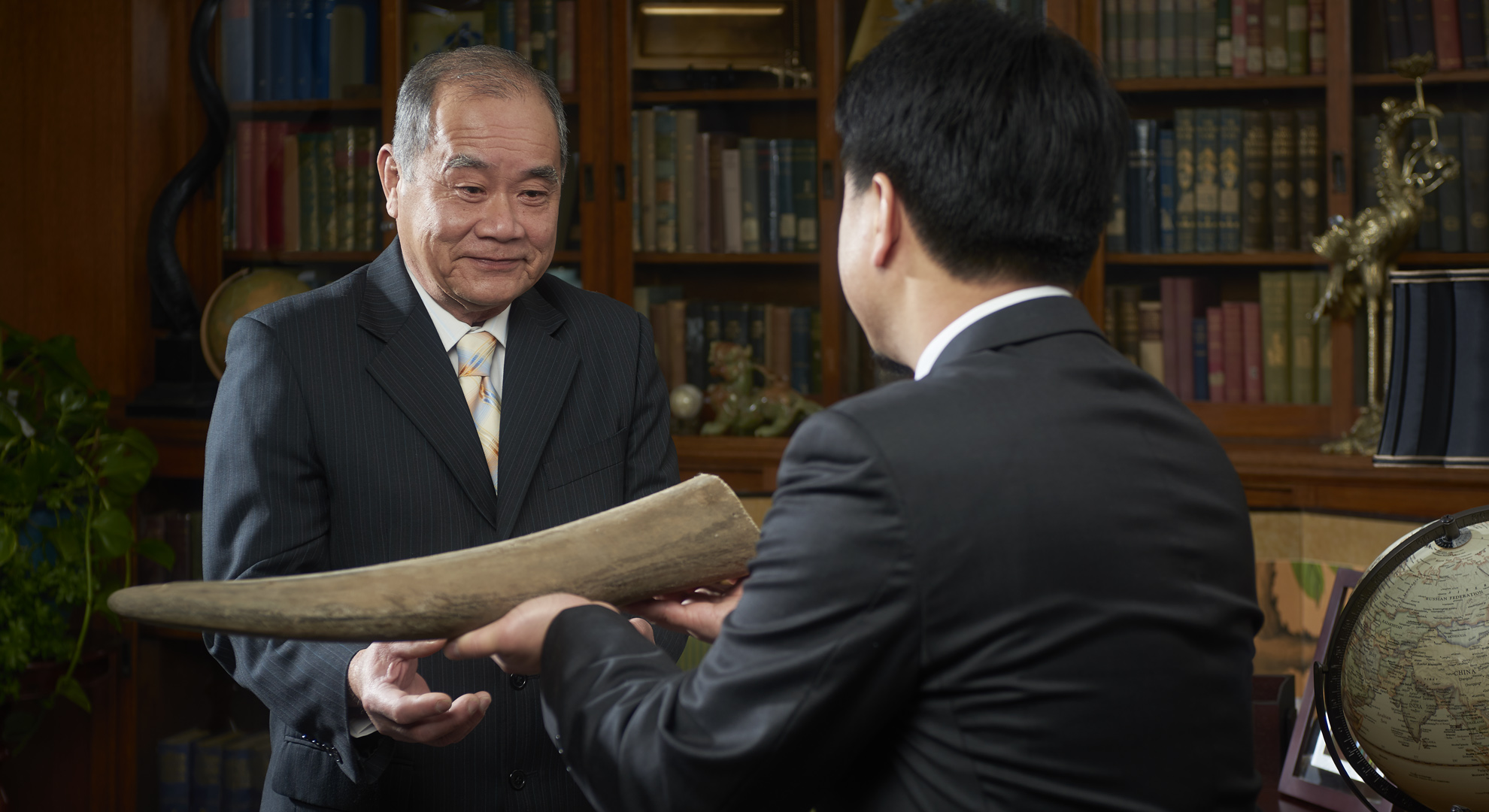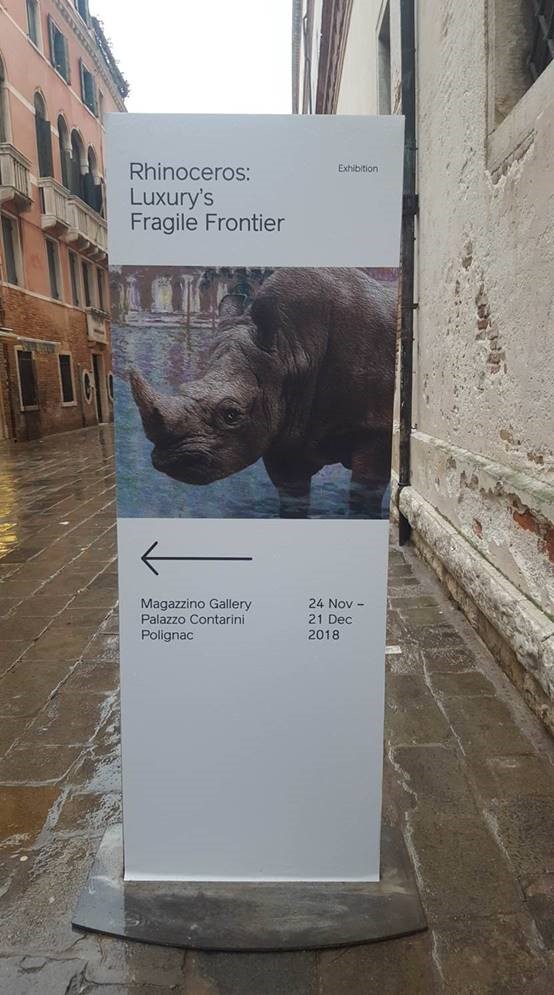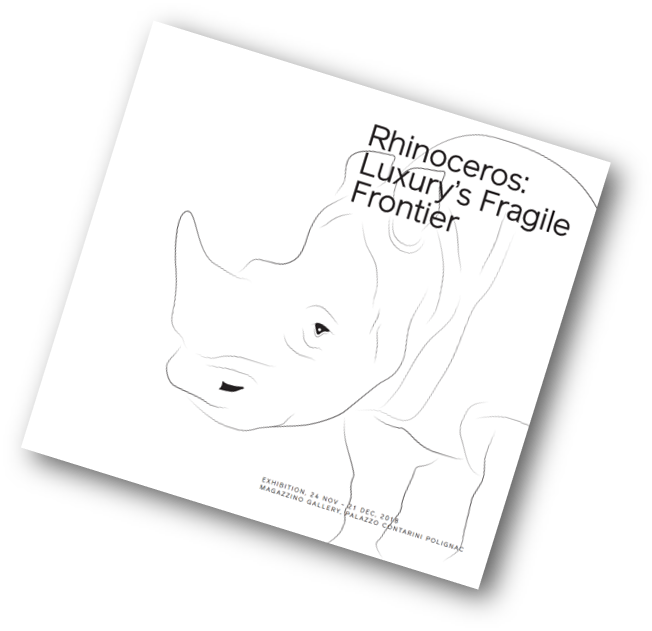
While much of 2019 has been dedicated to the research and works on the need for CITES modernisation project, with just 2 days to go before heading to CITES CoP18, I would like to update our supporters on another Nature Needs More project, Extinction: The Vulgarity of Desire.
In an October 2018 blog, I introduced an event Rhinoceros: Luxury’s Fragile Frontier, a collaboration of academics, conservationists, artists and business, organised and curated by Dr Catherine Kovesi of the University of Melbourne, to present a symposium and exhibition highlighting the need to tackle the destructive pseudo-luxury market.This unrestrained luxury consumption is not only impacting the worlds endangered species but also its unique history, as a growing consumer class desire luxury travel experiences; for example, Venice is said by many to be a city being “consumed to death”.

The exhibition was launched, on the 23 November 2018, with a symposium interrogating the impacts of this unconscious and unrestricted luxury consumption, past, present and future.
For Nature Needs More this project enabled us to present some of our research on the systemic causes of excessive luxury consumption and how much is driven by the status gained from consuming rare luxury products and experience. Today, too many buyers of luxuries appear happy to destroy what they consume, as they can gain additional status from having consumed the luxury before it goes extinct or becomes otherwise inaccessible.
Nature Needs More’s exhibition video illustrates the work that needs to be done to challenge unrestricted luxury consumption of an illegal ‘product’ – rhino horn. While this is just one animal, it is important to remember the scale of the problem created by our excessive consumption of wildlife and the habitats they need to exist. Today, of all the mammals on earth only 4% are wild animals; 96% are livestock and humans.
For more insights in to how we created our demand reduction campaign, please take a look at the 8-minute, exhibition video: Extinction: The Vulgarity Of Desire

And for more of the back story, please download the exhibition catalogue.
The exhibition told the story of what is currently being done to tackle consumer demand, trigger a behaviour change in the key consumer group and reduce rhino poaching. While this is an important start, we need to look to the root causes of destructive pseudo-luxury (both illegal and legal) market. These are discussed in Nature Needs More’s symposium presentation titled: Reinventing Magnificence: Status from Contribution.
In our current society what we buy defines us. Social status, self-identity, social differentiation and self-worth are today linked to consumption. This addiction to consumption for status and self-worth gain has in recent years been termed affluenza. There is nothing rational about being addicted to buying, yet this is not an individual disease; it is a manufactured affliction. We have just forgotten (or never experienced) what the world was like without being bombarded by thousands of adverts every day. Currently, in the Western world, opting out of this consumption addiction requires both a secure identity and massive willpower to NOT conform.
During interviews with consumers of illegal wildlife, it became apparent that an evolution occurred in their consumer behaviour. Once they had purchased more mainstream legal manufactured luxuries, they evolved to legal rare luxury products, often associated with endangered species. For example, many people would be surprised to find out it is legal to have a car interior upholstered in elephant skin and a range of rare, exotic leather.
While consumers must take responsibility for the consequences of their purchasing behaviour, business practices, marketing and media play their part and must be interrogated.
But what happens when legal luxury is not enough? How do you stand out?#
Illegal luxuries are one avenue to achieve status differentiation. Thankfully, doing something illegal is not for everybody and most people shun going down this path. But that doesn’t change the fact that the pressure to differentiate yourself exists and that usually when a handful of pioneers and early adopters create a new market, others will follow. Especially if the suppliers can get insanely rich in the process, with minimal risk, such as in the case of wildlife trafficking.
The luxury fashion sector must play their part in tackling the destructive luxury market. With the increasing focus on ‘Fixing Fashion’ to ensure the industry is more ethical, one issue the industry says is a priority is supply chain transparency. Certainly, I see very little evidence that wildlife is factored into the emerging sustainable fashion strategy, as was first mentioned in March 2018 blog Sustainable Fashion and Wildlife
While we need governments to effectively legislate to save the natural world and ensure regularly systems are fit-for-purpose and adequately resourced, we need business to take responsibility for the part it plays in driving up the desire for rare and precious endangered species. Ensuring wildlife is factored in to the evolving sustainable fashion strategy and contributing to the costs of developing supply chain traceability is just a start.
As consumers and as a civil society more broadly, we must interrogate why too many aspire to and worship luxury consumption as a way to express their self-identity and self-worth, how did we get to this?
So if we were to re-invent magnificence, what form could it take? The first is that a new form of magnificence cannot necessary be based on empathy or compassion. Historically magnificence was based on status and implied obligation, and the link was broadly accepted by the population at large. Anything based solely on compassion with nature cannot be broadly accepted as yet, we are still in the process of increasing our distance from nature through urbanization. For now we must also accept that status and hence luxury consumption for status gain are tribal – meaning is conveyed primarily to the ‘in-group’. Creating a new form of status differentiation means creating a new hierarchy of contribution that is meaningful to the tribe and seen as a public good by the wider population.
To hear more background on our research and the talk given at the symposium, please follow the link.
In closing, I would like to thank Dr Catherine Kovesi of University of Melbourne, whose specialist research areas include the history of luxury consumption. I very much appreciate Catherine’s ongoing interest and support with this work. Little did Catherine know that rhinos were going to crash her life!

